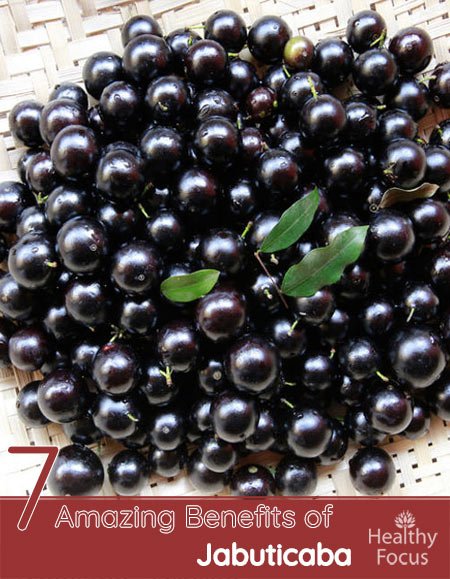Last Updated on December 27, 2018 by Marc Seward
What is Jabuticaba?
Have you heard about the fruit jabuticaba and its benefits? This dark and sweet fruit grows on an evergreen tree only native to South America. It goes by the name scientific name Plinia cauliflora and is sometimes also referred to as the Brazilian Grapetree.
Jabuticaba not only provides such health benefits as treating diarrhea or possibly preventing the development of cancer, but it can also be used to make juice, wine, or jelly.
Jabuticaba Fruit
This tropical fruit boasts a sweet taste flavor and is unique in that it grows on the trunk of the tree from which it’s extracted. At its inception jabuticaba starts off as a lovely white flower, which eventually develops into a delicious purple fruit.
The tree, perennial in nature, sprouts fruit two to three times a year, however, if the tree is consistently tended to, it can produce fruit all year round. The evergreen tree that produces the fruit works best in a moist and acidic soil.
When the flowers bloom and eventually turn into a delicious fruit, the fruit appears like a grape: small, round, with an almost slippery dark grape skin. Encased within the skin is fleshy and juicy pink meat with four big seeds at its center.
How to Enjoy Jabuticaba Fruit
Jabuticaba is best enjoyed fast, however, you’ve got to move fast as the fruit starts to ferment three to four days after its been harvested. Because the fruit quickly ferments after being picked, you’ll be hard pressed to find it outside of markets in South America.
If you are not native to an area where jabuticaba is harvested, when visiting the area, you may want to seek this fruit out to enjoy a rare and nutritious treat.
Once you get your hands on the fruit, peel the dark skin to expose the delicious edible pink meat. Jabuticaba is commonly used to make jams, juice, and even used as a flavoring in cakes and other foods. Due to it highly fermentable nature, jabuticaba is commonly used to make strong wines.
Storage
Because the shelf life of jabuticaba fruit is so short, you have to be mindful of storage. When stored at room temperature, jabuticaba keeps two to three days. After that, it starts to rapidly ferment. However, if you keep the fruit in the refrigerator, it will stay fresh for about six days.
Nutritional Value
Due to its rich nutritional value, jabuticaba is very popular in Brazil. When eating jabuticaba, you can expect to consume the following vitamins and minerals:
- Minerals: A high mineral content, jabuticaba contains calcium, phosphorus, and iron.
- Vitamins: Rich in vitamins, jabuticaba has a very high content of vitamin C, making it an antioxidant powerhouse. Jabuticaba also contains B-complex vitamins such as niacin, riboflavin, and thiamin.
- Amino Acids: Amino acids are essential to our health, so it’s a good thing that jabuticaba contains such amino acids as lysine and tryptophan.
The Benefits of Jabuticaba
When you bite into this juicy fruit, it’s reminiscent of lychee, however, it delivers its own set of unique benefits. Listed here are some of the benefits associated with jabuticaba.
1) Possible Anti-Cancer Agent:
Some preliminary studies have found that jabuticaba may help to protect against the development of cancer. Jabuticaba contains such anticancer compounds as anthocyanins, which is believed to inhibit the development and spread of cancer cells.
Rich in antioxidants, jabuticaba is believed to help prevent the development of cancer because they scavenge free radicals in the body preventing and reversing damage done to cells. However, more rigorous, scientific research needs to be conducted to confirm these results.
2) Treats Diarrhea
In South America, jabuticaba has commonly been used to help treat bouts of diarrhea. When dried, crushed, and mixed with the water, the skin of the jabuticaba slows bowel movements.
Once you’re able to keep food in your system, eating the meat of the fruit restores nutrients and vitamins lost while sick. This helps to speed up recovery time and helps prevent dehydration.
3) Anti-inflammatory
The rich antioxidant activity in jabuticaba has strong anti-inflammatory affects. By enjoying a diet rich in anti-inflammatory foods, you help prevent the development of diseases such as diabetes and heart disease.
Anti-inflammatory foods are great when suffering such inflammatory conditions as arthritis, which are painful and can reduce the overall quality of life.
4) Natural Detox
Jabuticaba is great for the liver. Jabuticaba helps to take the stress off this busy organ by helping to filter out toxins while nourishing the body with vitamins and minerals. Regularly consuming this fruit helps to keep your body free of illness-causing toxins.
5) Great for Asthmas Sufferers
Natives of South America believe jabuticaba is a beneficial for those suffering from asthma. Jabuticaba is believed to keep the airways and passages to the lungs clear by opening bronchi. There is currently no evidence supporting this claim, however.
6) Prevents Premature Aging
The rich antioxidant content of jabuticaba may help slow the aging process. The antioxidants help to neutralize antioxidants that ravage the skin with age spots and fine lines. Regularly consuming this sweet fruit may help to ensure the integrity of your skin a little bit longer.
7) Sore Throat Remedy
In South America, jabuticaba is commonly used as a remedy for sore throats. When the juice is squeezed from the fruit and mixed with warm water, jabuticaba has a soothing effect on raw and sore throats.
The rich vitamin C content as well as other vitamins and minerals help to fight infection, speeding up the healing process.
Some Considerations
When eating jabuticaba, please consider the following:
- There is currently no scientific evidence backing up some of these claims.
- Eating the skin of the fruit may cause constipation.
- It is advised to consume this fruit in moderation.

Leave a Reply
You must be logged in to post a comment.